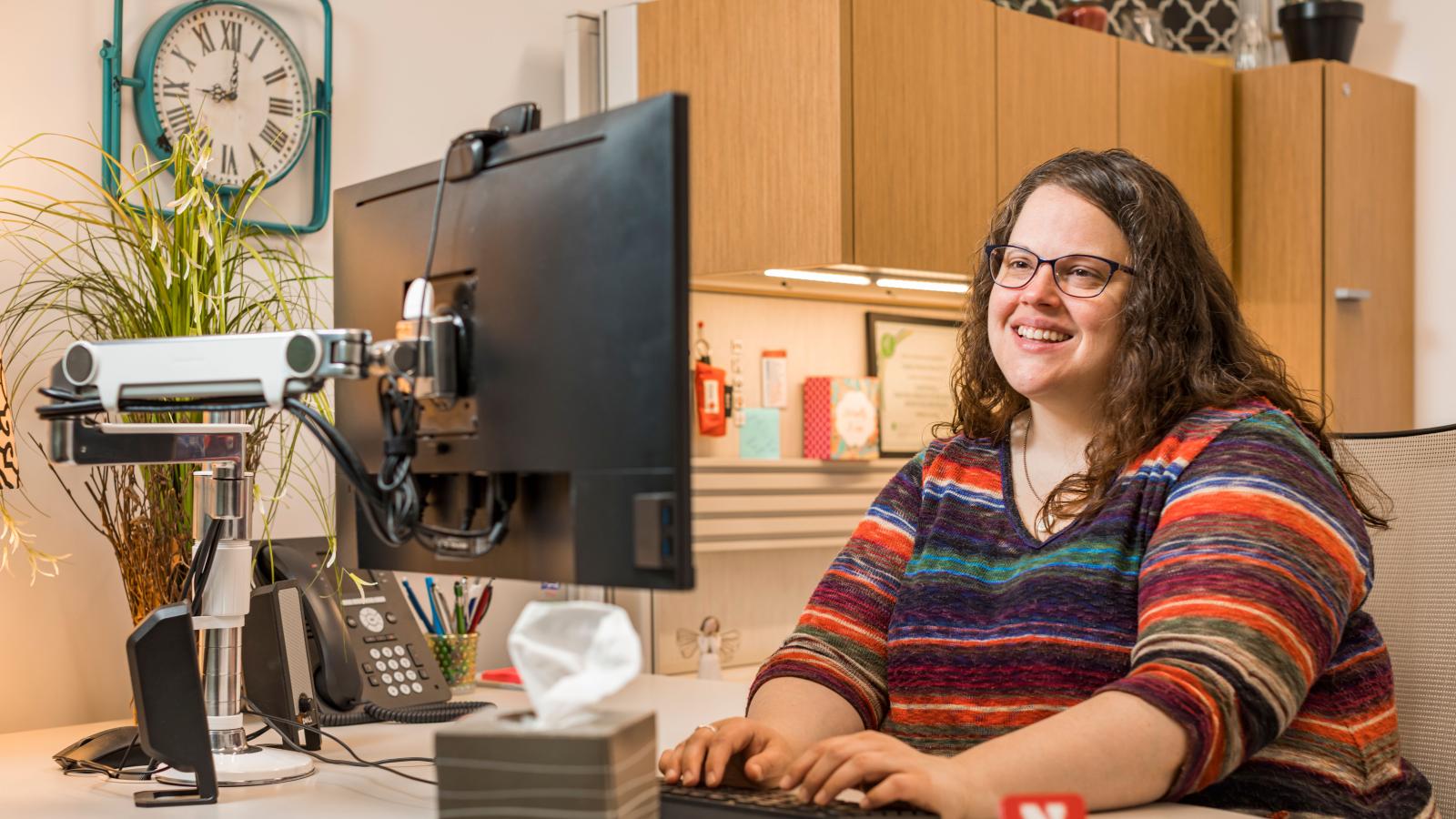
Hours of Service
Monday through Friday: 8 a.m. to 5 p.m.
Saturday and Sunday: Closed

Patient Eligibility
- University of Nebraska students from all campuses

Services Covered By Student Fees
- Psychiatric Medication Management services are not covered by student fees
Medication and Expert Care to Help You Manage Mental, Emotional and Behavioral Concerns
Our robust team of psychiatric providers offers evaluation, education and medication management for a wide array of conditions, such as depression, anxiety, life stressors, eating disorders, ADD/ADHD, bipolar disorder, insomnia, schizophrenia and more.
If you would like to explore medication options in treating your mental health symptoms, please call 402.472.5000 to schedule an initial evaluation with one of our psychiatry providers. For those who are unsure or do not want to take medication, we recommend scheduling a therapy appointment with Counseling and Psychological Services by calling 402.472.7450. Best practices show that therapy combined with medication management prove to have the most positive outcomes in treating mental health disorders. Therefore, we recommend therapy with CAPS or a therapist in the community along with our medication management services in order to provide you with the best treatment possible.
Appointments
We provide psychiatric care Monday through Friday from 8 a.m. to 5 p.m. To make an appointment, call 402-472-5000.
Cost
Psychiatric medication management visits are considered specialty appointments and are not covered by student fees. There are charges for each visit. To determine how much your visit will cost, we recommend contacting your health insurance provider for coverage information. Patients are responsible for any charges not covered by insurance.
Learn more about cost and insurance.
Please be advised, mental health appointments with a health center general medical provider are also not covered by student fees and will incur a charge.
Mental Health Prescriptions
The University Health Center pharmacy can fill orders for most mental health medications. Contact your psychiatric provider to transfer your prescriptions. If we do not have the medication in stock at our pharmacy, we can usually order it for you. We can also send your medications to the pharmacy of your choice.
Urgent Concerns
If you are having a problem with a psychiatric medication, call the health center at 402-472-5000. Follow the prompts if you are calling after hours. If your problem is urgent or involves serious side effects, call or go to the nearest emergency room. The nearest emergency room to campus is Bryan Medical Center West (2300 S 16th St).
If you are experiencing a mental health crisis, call Counseling and Psychological Services at 402-472-7450 and follow the prompts. Help is available 24/7.
Meet Our Staff
Frequently Asked Questions
Why would I be referred to the University Health Center medical staff for psychiatric screening?
This may happen if you are experiencing mental health symptoms that could benefit from medication. This referral can come from a primary care provider, a counselor or an advisor. A student can also refer themselves for a psychiatric screening. Symptoms that may lead to a psychiatric screening referral include depression, anxiety, insomnia, suicidal thinking, etc.
What happens when I am referred to the health center for psychiatric screening? What does the screening appointment involve?
The first step is to call 402.472.5000 to schedule an in-person or telehealth psychiatric appointment. During the 60-minute initial appointment, you will discuss your current and past psychiatric history and collaborate with the psychiatry provider on a recommended treatment plan. At the end of the screening, you will usually be instructed to schedule a follow-up appointment.
What can I expect during my first appointment with a psychiatric provider?
Your first appointment is scheduled for 60 minutes. It begins similar to a regular doctor’s appointment. After you’ve checked in at the front desk, a nurse will call you back from the waiting room and will gather your vital signs, review your allergies and medications and go over your health history. When this is completed, you will then meet with a psychiatric team member. Plan on being asked a lot of questions about your physical health (past or current illnesses, injuries or surgeries), social history (school, work, hobbies, relationships, gender identity, spiritual beliefs, drug/alcohol use, etc.) and mental health history (any treatment you may have received prior to this appointment). Of course, time will also be spent discussing the concerns that prompted you to schedule the appointment.
At the end of the evaluation, the psychiatric provider will talk with you about your symptoms and possible diagnosis, go over your treatment options (which may or may not include medication), answer any questions you may have and schedule a return appointment.
What are follow-up appointments like?
After you’ve been established with one of our psychiatric providers, follow-up appointments are scheduled to see if your symptoms are improving, if any changes should be made and to address any additional questions or concerns you may have. Follow-up appointments are scheduled on average for 30 minutes but can vary depending on your needs. How often you will follow up with your psychiatric provider is determined by you and your provider. Usually, you meet monthly once medications are prescribed. However, this varies on a case-by-case basis. Visit frequency can range from weekly to every three months depending on symptoms, side effects, diagnoses, and patient/provider preference.
How does a member of the psychiatric team determine what medication to prescribe for me?
These decisions are based on several criteria, such as your symptoms, if you have any other medical conditions, what medications/herbal supplements you are currently taking, what medications you’ve already tried, etc.
Remember, responses to medication are highly individualized. A medicine that works well for one person (even if a family member) may work very differently for you. It may require trying a few different medications to find the right one that works for you. It is also important to remember that any medication can take up to eight weeks or longer to achieve the full benefit.
What happens if medical staff recommends medication, and I’m still unsure about it?
In many cases, if you are still unsure about a medication after the provider explains the benefits and risks, you can take time after the appointment to think about the medication and read more about it from information that the provider gives you. You can schedule a follow-up appointment after you have decided about the medication.
Will taking medication change who I am or my personality?
No. The goal of treatment is to stabilize brain chemistry and relieve your symptoms so you can feel like yourself again. Think of it like having a broken leg. Putting a cast on your leg doesn’t change who you are. Instead, it stabilizes your leg so you’re more capable of being who you are. It is very important to take your medication consistently in order to improve your symptoms.
Is taking medication a sign of weakness?
No. Treating mental health issues with medication is no different than taking medication for medical conditions like allergies, asthma, infections or diabetes.
Can I become addicted to anti-depressant medication?
No. These medications are not addictive. Although any time your body becomes used to taking a daily medication, patients may experience discontinuation symptoms if they were to stop the medication abruptly. There are some medications in other drug classes used by medical providers that can be habit forming. Your provider will discuss this with you should it become a concern. At any time, feel free to ask questions.
How much will it cost to get screened for medications?
This charge may vary. Please call 402.472.5000 and select the billing and insurance option to discuss the current cost with a staff member. The amount you pay is determined by your insurance plan. If you do not have health insurance and cannot afford medical care, you may be eligible to apply for the financial assistance program.
How often will I meet with medical staff once medication is prescribed?
Usually, you meet monthly once medications are prescribed. However, this varies on a case-by-case basis. Visit frequency can range from weekly to every three months depending on symptoms, side effects, diagnoses, and patient/provider preference. For students receiving ADHD stimulant medication, we require visits at least every three months.
Tell me about the costs of medications. I hear they can be expensive.
Medications may be covered by your insurance company. Give your insurance card to the pharmacy when you pick up the medication. You might have a copay even if the medication is covered by insurance. When possible, the provider tries to pick an affordable medication. Sometimes the medication is not covered by insurance, which can make it expensive. Other times, the medication is covered by your insurance, but it is still expensive. If this is the case, the provider will work with you to find a medication that is cost-effective for you. The health center has programs available for students who need financial assistance.
Will my parents find out that I’m taking mental health medications (if prescribed)?
If you are 18 or older, parental permission is not required to receive mental health care, including psychiatry. If you are on your parents’ insurance plan, you may choose to pay cash for medications and/or visits instead of submitting them to insurance so that your parents do not receive an Explanation of Benefits.
I don’t want to be on medication for the rest of my life. How do I know when I can safely stop taking prescribed psychiatric medications?
Some medications are indicated for short-term use. Other medications are indicated for longer-term use. Talk with your psychiatric provider about the recommended length of your treatment. This is determined on a case-by-case basis by considering diagnosis, symptom severity, previous psychiatric history, environmental stressors, etc.
What side effects can I expect from taking mental health medication?
Side effects vary depending on which class of medication you are prescribed. Your provider will discuss potential side effects with you before you start a medication. However, common side effects of psychiatric medications include nausea, lightheadedness, dizziness and headache. In general, side effects should go away within the first few days or weeks of starting the medication or changing the dose. If side effects persist, talk with your psychiatric provider about this.
Should I tell my medical provider about other medications I take or my level of alcohol or drug use?
Yes, please be open and honest with your provider about this. The nurse will usually ask you about all the medications you are taking at the beginning of your visit.
Are there any scholarships to help cover the costs of psychiatry appointments or prescriptions?
A financial assistance program is available to those who qualify. You must provide certain documentation and complete a lengthy application process to be considered for approval. Call 402.472.5000 and select the billing and insurance option to discuss this with a staff member. You are responsible for all your costs. Prescription copay assistance options are available. The health center pharmacy staff offers free enrollment assistance.
How will University Health Center staff work with my CAPS therapist?
Students can fill out a release of information that gives consent to allow communication between their therapist and their medical provider.
What does the transfer process look like if I return home (out of the city/state) for breaks, etc.?
This is determined on a case-by-case basis. For most students who remain in Nebraska during summer and winter breaks, we can continue to provide in-person or telehealth provide care. For out-of-state patients, sometimes you will be asked to find a primary care provider or psychiatrist back home who can see you over break and provide medication. Other times, we may be able to give you refills of your medication to cover you over the break. Determining factors include recent medication changes, diagnoses, level of stability, etc.
I think a medication could be helpful, but it’s mid- to late-spring. Can I start a medication if I plan on leaving the city or state for the summer? If so, how would this be transferred if I don’t have a provider yet out of city or state? Are you able ...
I think a medication could be helpful, but it’s mid- to late-spring. Can I start a medication if I plan on leaving the city or state for the summer? If so, how would this be transferred if I don’t have a provider yet out of city or state? Are you able to help me locate a provider?
Yes, you can start a medication in the spring even if you plan on leaving Lincoln for the summer. If you remain in Nebraska, we can offer telehealth appointments even while you are in a different city. If you leave the state, we can decide on appropriate summer treatment plans, including whether you need to find a provider back home. Your psychiatry provider can help you locate a provider if you need assistance.
I think I have ADD/ADHD, but I’ve never been diagnosed. Can you evaluate me?
Psychological testing is the gold standard in making the most accurate diagnosis of ADD/ADHD. Our psychiatric providers do not provide that sort of assessment. Because so many other conditions can look like ADD/ADHD, we recommend contacting Counseling and Psychological Services at 402-472-7450 to schedule an appointment with a therapist and further discuss your symptoms. If psychological testing is recommended, then a referral to a psychologist in the community will be provided. Our psychiatric providers can also provide you with community referrals if needed. Please be advised, in most cases, ADD/ADHD medication will not be prescribed without a formal ADD/ADHD diagnosis. The decision will be up to your psychiatric provider and is made on a case-by-case basis.
What if I already have a psychiatric provider at home but would also like to see a health center psychiatric provider?
No need to worry. Our psychiatric team is more than willing to coordinate care with your psychiatric provider at home. Every effort is made to be sure the transitions between home and school are as seamless as possible.
What if I already have a psychiatric provider at home and all I need are my medication(s) refilled?
The best option is to have your psychiatric provider at home write a prescription that you can have refilled at the health center pharmacy. Our psychiatric team cannot refill medications without having an initial evaluation and routine follow-up appointments.
I heard that the University Health Center offers genetic testing. Is this true?
Yes, but maybe not the kind of genetic testing that first comes to mind. The genetic testing offered at the health center evaluates how well a person metabolizes various medications. It does not provide any information on ethnicity or medical conditions. The test can only be ordered by a medical provider and will require a full psychiatric evaluation if you have not already established care with one of our psychiatric providers. This test is not free and is not covered by most insurance companies. Please visit the Gene Sight website or talk with your psychiatric provider for more information.
Are there other resources for students with mental health concerns?
If you are feeling stressed or need to talk to someone, contact the experts at Counseling and Psychological Services. They provide free short-term counseling, group therapy and other options to help you manage your concerns.
Big Red Resilience and Well-being offers many resources to students. You can visit their office located on level one of the University Health Center or visit their website.
The Office for Students with Disabilities can help if your condition leads to difficulties with your academic success. Accommodations may be available.




